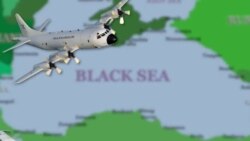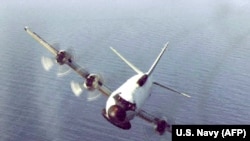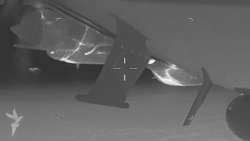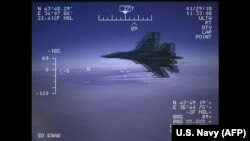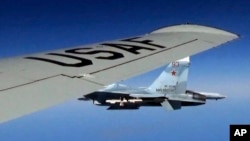On Monday, November 4, a U.S. Navy EP-3E Aries II reconnaissance aircraft was flying over the Black Sea in international airspace when it was approached by a Russian Su-27 fighter jet.
During an “interaction” which the U.S. Navy said lasted about 25 minutes, the Russian jet conducted “a high speed pass directly in front of the mission aircraft, putting at risk the pilots and crew,” the U.S. 6th Fleet said in a statement.
According to the 6th Fleet, the EP-3 was “operating in accordance with international law and did not provoke this Russian activity.”
The Russian Defense Ministry released a statement saying the EP-3 had been intercepted while approaching Russian territory.
“An Su-27 fighter jet took off from the nearest airfield of the on-duty air defense unit. It approached the aircraft at a safe distance and identified it as an EP-3E Aries signals reconnaissance version of the U.S. Navy. The fighter crew reported identification of the U.S. signals reconnaissance aircraft and escorted it away from the airspace of the Russian Federation in compliance with all security and safety requirements," read the Russian Defense Ministry statement.
But later on November 5, the U.S. Navy released a video corroborating its account of the event.
"The intercepting Su-27 made an additional pass, closing with the EP-3 and applying its afterburner while conducting a banking turn away. The crew of the EP-3 reported turbulence following the first interaction, and vibrations from the second," the Navy said.
Or, in the words of Pentagon spokesman Eric Pahon: “They buzzed us. They got a little too close,” the Navy Times cites him as saying.
“There’s just absolutely no reason for this type of behavior,” ABC News cited Pahon as saying. He said the last unsafe encounter with a Russian aircraft had happened in January.
On November 1, the Russian Defense Ministry released a statement saying at least 17 foreign planes and unmanned aerial vehicles had flown near Russia’s borders in just a week, RT reported. It added that fighter jets had been scrambled four times to prevent potential violations of the country’s borders.
Regarding the latest incident, the 6th Fleet said the “Russian military is within its right to exercise within international airspace,” but added the most recent interaction was “irresponsible.”
“Unsafe actions increase the risk of miscalculation and potential for midair collisions,” the 6th Fleet said.
Based on the available video evidence, the Russian Defense Ministry’s claim that all security and safety requirements had been followed to carry out the latest intercept is demonstrably false.




